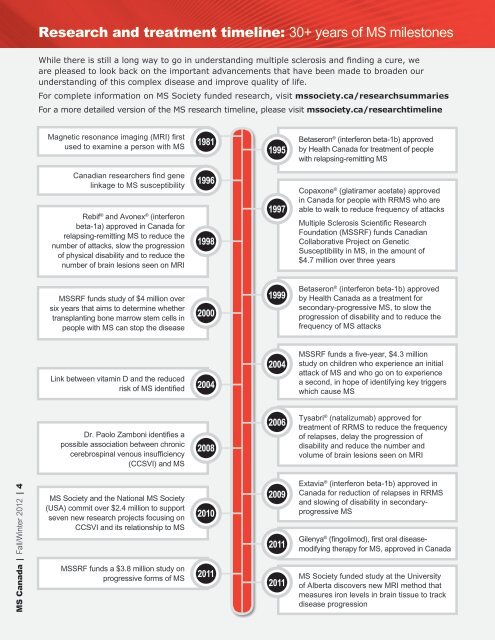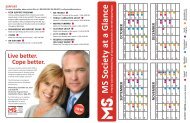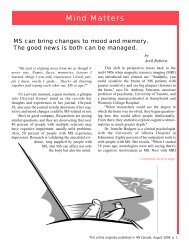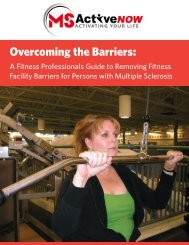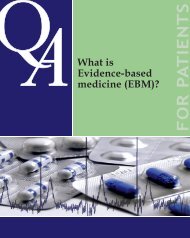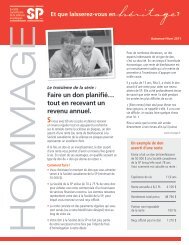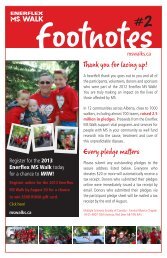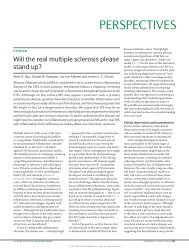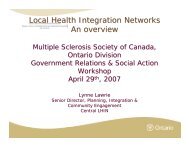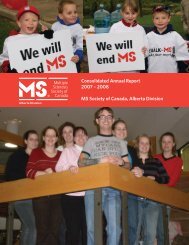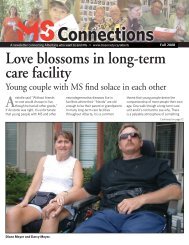Research and treatment timeline: 30+ years of ms milestones | 4
Research and treatment timeline: 30+ years of ms milestones | 4
Research and treatment timeline: 30+ years of ms milestones | 4
You also want an ePaper? Increase the reach of your titles
YUMPU automatically turns print PDFs into web optimized ePapers that Google loves.
<strong>ms</strong> canada Fall/Winter 2012 4<br />
<strong>Research</strong> <strong>and</strong> <strong>treatment</strong> <strong>timeline</strong>: <strong>30+</strong> <strong>years</strong> <strong>of</strong> MS <strong>milestones</strong><br />
While there is still a long way to go in underst<strong>and</strong>ing multiple sclerosis <strong>and</strong> finding a cure, we<br />
are pleased to look back on the important advancements that have been made to broaden our<br />
underst<strong>and</strong>ing <strong>of</strong> this complex disease <strong>and</strong> improve quality <strong>of</strong> life.<br />
For complete information on MS Society funded research, visit <strong>ms</strong>society.ca/researchsummaries<br />
For a more detailed version <strong>of</strong> the MS research <strong>timeline</strong>, please visit <strong>ms</strong>society.ca/research<strong>timeline</strong><br />
Magnetic resonance imaging (MRI) first<br />
used to examine a person with MS<br />
Canadian researchers find gene<br />
linkage to MS susceptibility<br />
Rebif ® <strong>and</strong> Avonex ® (interferon<br />
beta-1a) approved in Canada for<br />
relapsing-remitting MS to reduce the<br />
number <strong>of</strong> attacks, slow the progression<br />
<strong>of</strong> physical disability <strong>and</strong> to reduce the<br />
number <strong>of</strong> brain lesions seen on MRI<br />
MSSRF funds study <strong>of</strong> $4 million over<br />
six <strong>years</strong> that ai<strong>ms</strong> to determine whether<br />
transplanting bone marrow stem cells in<br />
people with MS can stop the disease<br />
Link between vitamin D <strong>and</strong> the reduced<br />
risk <strong>of</strong> MS identified<br />
Dr. Paolo Zamboni identifies a<br />
possible association between chronic<br />
cerebrospinal venous insufficiency<br />
(CCSVI) <strong>and</strong> MS<br />
MS Society <strong>and</strong> the National MS Society<br />
(USA) commit over $2.4 million to support<br />
seven new research projects focusing on<br />
CCSVI <strong>and</strong> its relationship to MS<br />
MSSRF funds a $3.8 million study on<br />
progressive for<strong>ms</strong> <strong>of</strong> MS<br />
1981<br />
1996<br />
1998<br />
2000<br />
2004<br />
2008<br />
2010<br />
2011<br />
1995<br />
1997<br />
1999<br />
2004<br />
2006<br />
2009<br />
2011<br />
2011<br />
Betaseron ® (interferon beta-1b) approved<br />
by Health Canada for <strong>treatment</strong> <strong>of</strong> people<br />
with relapsing-remitting MS<br />
Copaxone ® (glatiramer acetate) approved<br />
in Canada for people with RRMS who are<br />
able to walk to reduce frequency <strong>of</strong> attacks<br />
Multiple Sclerosis Scientific <strong>Research</strong><br />
Foundation (MSSRF) funds Canadian<br />
Collaborative Project on Genetic<br />
Susceptibility in MS, in the amount <strong>of</strong><br />
$4.7 million over three <strong>years</strong><br />
Betaseron ® (interferon beta-1b) approved<br />
by Health Canada as a <strong>treatment</strong> for<br />
secondary-progressive MS, to slow the<br />
progression <strong>of</strong> disability <strong>and</strong> to reduce the<br />
frequency <strong>of</strong> MS attacks<br />
MSSRF funds a five-year, $4.3 million<br />
study on children who experience an initial<br />
attack <strong>of</strong> MS <strong>and</strong> who go on to experience<br />
a second, in hope <strong>of</strong> identifying key triggers<br />
which cause MS<br />
Tysabri ® (natalizumab) approved for<br />
<strong>treatment</strong> <strong>of</strong> RRMS to reduce the frequency<br />
<strong>of</strong> relapses, delay the progression <strong>of</strong><br />
disability <strong>and</strong> reduce the number <strong>and</strong><br />
volume <strong>of</strong> brain lesions seen on MRI<br />
Extavia ® (interferon beta-1b) approved in<br />
Canada for reduction <strong>of</strong> relapses in RRMS<br />
<strong>and</strong> slowing <strong>of</strong> disability in secondaryprogressive<br />
MS<br />
Gilenya ® (fingolimod), first oral diseasemodifying<br />
therapy for MS, approved in Canada<br />
MS Society funded study at the University<br />
<strong>of</strong> Alberta discovers new MRI method that<br />
measures iron levels in brain tissue to track<br />
disease progression


